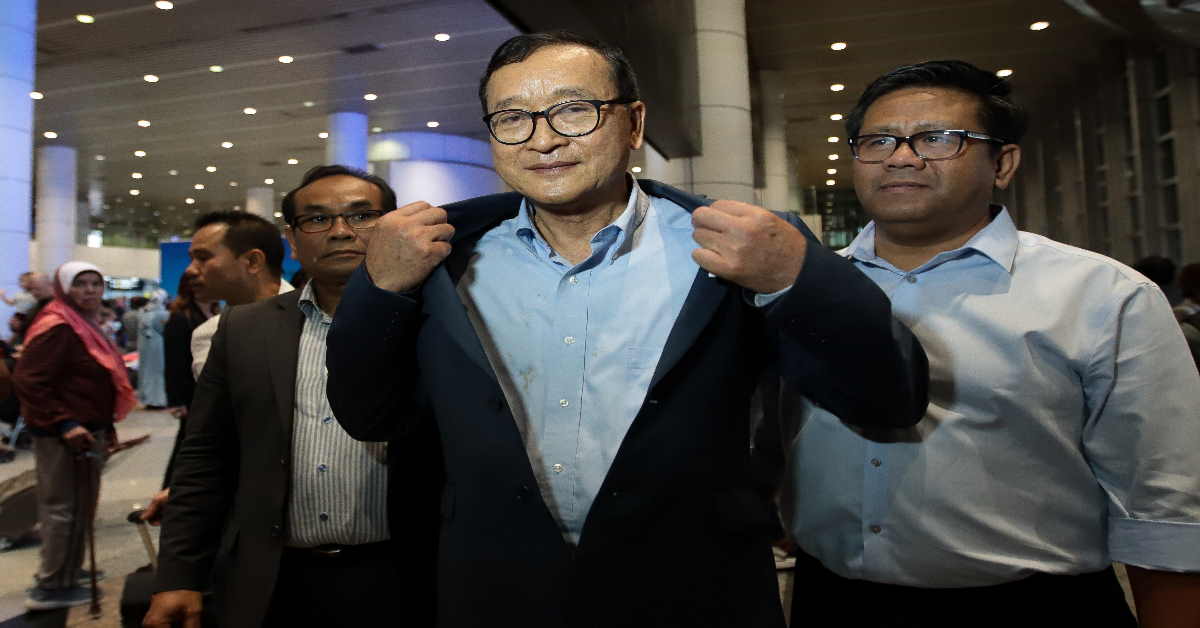Cambodia’s exiled opposition figurehead Sam Rainsy arrived in Malaysia Saturday as he sought to get home to rally his supporters against strongman Hun Sen, while security was ramped up at the kingdom’s borders and in Phnom Penh.
Rainsy, who has lived in France since 2015 to avoid jail for convictions he says are politically motivated, had promised a dramatic return on 9 November, Cambodia’s Independence Day.
But Hun Sen, who has ruled the poor Southeast Asian country since 1985, has repeatedly vowed to arrest him and other exiled members of his party if they come back.
Dozens of activists have been rounded up in recent weeks in Cambodia, while the authoritarian leader has called on neighbouring countries to help thwart the opposition’s attempts to return for what he has described as an attempted coup.
After being barred in Paris Thursday from getting on a flight to Thailand, Rainsy boarded a plane a day later and arrived at the main airport serving the Malaysian capital Kuala Lumpur.
A beaming Rainsy told his backers to “keep up the hope”, as he arrived and was greeted and hugged by a handful of supporters.
“We are on the right track,” said Rainsy, a founder of the Cambodia National Rescue Party (CNRP), which was dissolved ahead of much-criticised elections last year.
“Democracy has prevailed in Malaysia, democracy will prevail in Cambodia,” he told reporters at the airport.
Malaysians ejected a corruption-plagued government that had ruled the country for over six decades at the polls last year, and voted in a more reform-minded alliance.
While meeting his own deadline of returning to Cambodia by Saturday now appears out of the question, Rainsy insisted: “I will go back home, it is my right and my duty.”
But he refused to reveal further details, and appears to have few options.
Travelling overland to Cambodia now seems impossible as the leader of neighbouring Thailand has said he will not allow the opposition figure to transit through the kingdom.
One-party state
The 70-year-old said he planned to stay in Malaysia for several days, and would meet friends and take part in a discussion in parliament.
Observers are sceptical the former finance minister and arch-rival to Hun Sen – who hopes to unite his supporters to topple the government – will be able to return to Cambodia unless he strikes a deal with the strongman.
Hun Sen was not taking any chances, however.
In the Cambodian capital Phnom Penh, dozens of riot police were deployed while army trucks lined the main road to the international airport.
Security was also ramped up at the Thai-Cambodia border city of Poipet – seen as the most likely crossing point for Rainsy and other opposition figures if they try to come by land – with roads barricaded and lines of armed police standing guard.
Human Rights Watch praised Malaysia for allowing in Rainsy unimpeded, despite pressure from the Cambodian government to detain its foes, saying the move “deserves kudos”.
“Respecting basic human rights is not hard,” Phil Robertson, the group’s Asia deputy director, told the media.
“In contrast to repressive Thailand’s clampdown on the Cambodian exiles, Malaysia has shown there is another, more rights-respecting way to proceed.”
Mu Sochua – the deputy of the CNRP, who is also trying to return to Cambodia from exile – was detained when she arrived in Malaysia this week.
But she was released less than 24 hours later, and Malaysian officials have indicated she will not be forcibly deported.
The CNRP was viewed as Cambodia's only serious opposition and made major gains in 2013 elections on the back of growing dissatisfaction among the young, in a surprise showing that rattled Hun Sen.
But it was dissolved by a court in 2017 ahead of elections the following year. That paved the way for the ruling Cambodia People’s Party to win all 125 parliamentary seats, turning the country into a one-party state. - AFP
